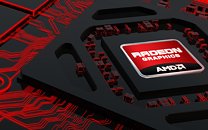Wednesday, February 1st 2017

AMD Files Patent Infringement Complaint Against LG, Vizio, Others
On January 24, 2017, AMD filed a complaint against several prominent tech companies, requesting that the ITC commence an investigation pursuant to Section 337. The basis for the complaint: some of these companies (namely, LG, MediaTek, VIZIO, and Sigma) unlawfully import into or sell inside the U.S. products which infringe on AMD's graphics intelectual property - namely, on U.S. Patent Nos. 7,633,506 (the '506 patent), 7,796,133 (the '133 patent) and 8,760,454 (the '454 patent) (collectively, the "asserted patents".
According to the complaint, these patents generally relate to architectures for graphics processing unit (GPU) circuitry. The '506 patent relates to "a graphics processing architecture that enables a large amount of graphics data to be rendered to a frame buffer". The '133 patent relates to specialized "texture" processing circuitry that is employed by GPUs. Lastly, the '454 patent relates to a "unified shader" hardware architecture for GPUs. The complaint specifically refers to various televisions and smartphones, specifically, towards the graphics processing systems within those televisions and smartphones - as infringing products.AMD asserts its vested interest in the mentioned patents, referring to the substantial investment it has done on developing products based on them, as well as its partner foundry GlobalFoundries on manufacturing products based on these patents. AMD also goes on to claim that the patent infringement damages its legitimate partners who have acquired the right to use them - namely, Samsung.
As a means of achieving justice on what AMD sees as gross violations on its intelectual property, the company only requests that the Commission issue a limited exclusion order and permanent cease and desist orders directed at the infringing companies - so, basically, that the products referenced in the complaint be prohibited of being imported to and sold on U.S. territory. No claims on have yet been filed, but considering how that is a common occurrence in this kind of practices, it's likely that AMD will still claim the payment of an indemnity and/or royalties that would have otherwise been paid by the infringing companies, if they are ever found of the malpractice that AMD filed against. All in all, this will probably go in one of three ways: the companies are found guilty and AMD stands to make money; the companies are found not to have been infringing on patents, in which AMD loses money; or the companies enter an agreement for cross patent licensing and maybe some monetary value changing hands between them. It's still too soon to look into any of these outcomes, though. For now, just know that AMD too sets lawsuits against other companies.
According to the complaint, these patents generally relate to architectures for graphics processing unit (GPU) circuitry. The '506 patent relates to "a graphics processing architecture that enables a large amount of graphics data to be rendered to a frame buffer". The '133 patent relates to specialized "texture" processing circuitry that is employed by GPUs. Lastly, the '454 patent relates to a "unified shader" hardware architecture for GPUs. The complaint specifically refers to various televisions and smartphones, specifically, towards the graphics processing systems within those televisions and smartphones - as infringing products.AMD asserts its vested interest in the mentioned patents, referring to the substantial investment it has done on developing products based on them, as well as its partner foundry GlobalFoundries on manufacturing products based on these patents. AMD also goes on to claim that the patent infringement damages its legitimate partners who have acquired the right to use them - namely, Samsung.
As a means of achieving justice on what AMD sees as gross violations on its intelectual property, the company only requests that the Commission issue a limited exclusion order and permanent cease and desist orders directed at the infringing companies - so, basically, that the products referenced in the complaint be prohibited of being imported to and sold on U.S. territory. No claims on have yet been filed, but considering how that is a common occurrence in this kind of practices, it's likely that AMD will still claim the payment of an indemnity and/or royalties that would have otherwise been paid by the infringing companies, if they are ever found of the malpractice that AMD filed against. All in all, this will probably go in one of three ways: the companies are found guilty and AMD stands to make money; the companies are found not to have been infringing on patents, in which AMD loses money; or the companies enter an agreement for cross patent licensing and maybe some monetary value changing hands between them. It's still too soon to look into any of these outcomes, though. For now, just know that AMD too sets lawsuits against other companies.


31 Comments on AMD Files Patent Infringement Complaint Against LG, Vizio, Others
Patents were intended to protect the "little guy" who invents something from the competitors which just want to steal all the hard work, under the assumption that it's an actual new invention requiring research, not just derivative work or prior art. Unfortunately software patents are completely stupid, and hardware patents are usually so vague that they affect prior art. This is not how patents were supposed to work at all, they should describe a precise invention, like a new form of combustion, a new medicine, a new type of transistor, a new type of solar panel, a new alloy, a specific type of circuitry, etc. The patents in question from AMD are good examples of patents of prior art or derivative works. Many companies have mastered the skill to apply for such patents, such vague patents are never to protect any real invention, but rather to "suddenly" start a legal dispute to get money from other companies. A legal dispute is very costly for many companies, for some it would cause ruins, which is why many opt to pay licenses rather than fight idiotic patterns. So in most cases it's considered futile to get a patent revoked, even if everyone knows it's total bullshit. This is why many companies have made a living as patent trolls, including companies like Rambus which was once a great technology company, but then gave up and started suing companies for technology they had used for many years…
Welp my mind was in simple mode this a.m., thinking that just a filing with the court, and then the lawyers on staff would have something to do, but indeed it get's complex very fast !
Make's sense as cdawall pointed out Samy was paying, so maybe they will get some revenue from this if it can hold up but it just seems so complex that if no one can make any product that has a visual effect without infringement on something that should have been addressed in the design phase of a product.
I was thinking it was more of a clear cut case that would be easy for them to pursue, but if indeed it turns into lengthy litigation then it's a harsh time to have to spend money they have that could be used to keep improving their products.
Any company that has those protections in place have every right to peruse an recoup from the investment they have.
Amd has made a mistake years ago with the Gainward fiasco, and it cost them the Palit Group, which turns out is/was[-thru 2015] the largest GPU manufacture for many years. That kind of mistake could have been dealt with better than what they tried, but believe AMD learned a lesson that they need to keep all their partners happy even if they may piss off some that could be future clients.